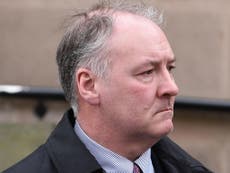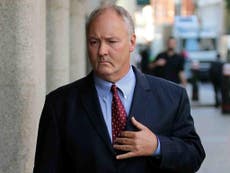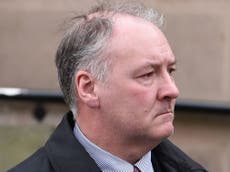The inquiry into rogue breast surgeon Ian Paterson doesn't address the real problem – the corrupt private hospital system
Rather than tackle the private hospital industry head-on, the report forwarded a series of low-impact recommendations which will do nothing to prevent another Paterson
Investors in the UK’s private hospital sector are likely to have breathed a huge sigh of relief yesterday, following the publication of the former Bishop of Norwich’s inquiry into Ian Paterson.
Between 1997 and 2011, the rogue breast surgeon harmed over 750 women at two private hospitals in the West Midlands, and made huge sums of money out of providing unnecessary operations. In 2017, Paterson was jailed for 20 years on 13 counts of wounding with intent, three of unlawful wounding. Yesterday’s report was intended to establish how Paterson was able to do damage on such a massive scale.
At stake for the investors was the possibility that the Right Reverend Graham James would deem their business model so incompatible with the safety of patients that it would require fundamental reform.
Yet rather than tackle the private hospital industry head-on, the bishop put forward a series of low-impact recommendations which will do nothing to prevent another Paterson, but instead leaves intact the archaic and dangerous form of medical practice that abetted him.
Although it is not well understood the private hospital industry treats the medical consultant as their “main customer”. This is because consultants are the main source of income for private hospitals, as it is they who bring their patients to the private hospital for treatment. Unlike in NHS hospitals they do not employ the consultants directly, but instead rent them their rooms and operating theatres.
It is estimated that for some of London’s private hospitals, each consultant is worth around £380,000 a year, with some consultants reputedly bringing in millions of pounds worth of business. So valued are consultants to private hospitals that they will often provide them with lavish hospitality and financial inducements to get them to bring their patients to their hospital, rather than to competitors.
This leaves private hospitals with very little incentive to challenge a consultant’s activities, as an overly strict hospital management could drive away a highly lucrative consultant and their steady stream of patients.
On the contrary, there is a strong financial incentive for private hospitals to turn a blind eye to the types of overtreatment for which Ian Paterson was responsible – since the more operations a surgeon carries out, the more money the hospital makes.
And there is even less incentive for private hospitals to challenge unnecessary treatment by the surgeon, since they can deny legal liability if something goes wrong. Unlike in the NHS, hospitals private hospitals do not directly employ the consultants who work in them. Hospitals can therefore argue that they are not responsible for their freelancer’s actions. In fact, when one of the patients harmed by Paterson sought compensation from the private hospital at which he had operated on her, she was told that they were under no obligation to provide her with a competent breast surgeon. Another was told that the hospital “only rented Paterson a room”.
In addition, the companies running private hospitals have no financial incentive to invest in adequate post-operative care since, if a patient does suffer life-threatening complications, the patient can be transferred to the local NHS hospital at no additional cost to the private hospital.
It is because the NHS provides this entirely free safety net that so few private hospitals in the UK have invested in their own critical care facilities. And in order to keep their own costs as low as possible, they typically rely on a single junior doctor working unsupervised for 168 hours a week to oversee all post-operative care.
It must have become clear to Rt Rev James during the course of his inquiry that it was this business model that facilitated Paterson’s actions, and which could have made private hospital managers reluctant to stop his unnecessary but extremely lucrative surgery. He could also have turned to the numerous coroner's reports which have made clear how the post-operative care arrangements in private hospitals contribute to patient deaths.
In response, he could have recommended at the very least that private hospitals take on full legal liability for what happens in private hospitals by employing the consultants directly rather than just to state that the government should address this, and he could have recommended that private hospitals should fundamentally reform their post-operative care arrangements and bear the full cost of any transfers to NHS hospitals.
He could also have tackled the toxic financial incentive structure which encourages the overtreatment of patients by recommending a clampdown on lavish corporate hospitality for consultants, and other financial inducements that distort clinical decision making.
Instead, he ducked out of the challenge, bizarrely recommending that patients be “made aware” of the risks associated with private hospital treatment, whilst leaving its dangerous business model – one that has no place within a modern healthcare system – completely untouched.
Whilst some may see private hospital safety as an issue only relevant to those who have insurance or pay for their healthcare, it is important to remember that the NHS is now relying on private hospitals to treat growing numbers of its patients.
In the last year, almost a third of all NHS hip operations were carried out in private hospitals. And as the tragic case of Peter O’Donnell – who died following treatment as an NHS patient in a private hospital – shows, NHS patients are now exposed to some of the same risks as those faced by Ian Paterson’s.
Despite so much investment in the inquiry by the hundreds of women maimed and injured by Paterson, the weak set of recommendations represents a missed opportunity to prevent such a tragedy from happening again and to protect the safety of growing numbers of NHS patients who are now being treated in private hospitals.
David Rowland is the director of the Centre for Health and the Public Interest.





Join our commenting forum
Join thought-provoking conversations, follow other Independent readers and see their replies